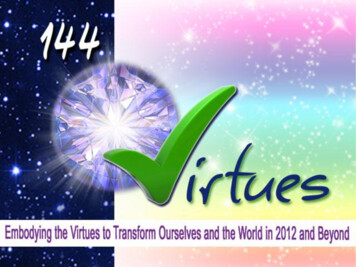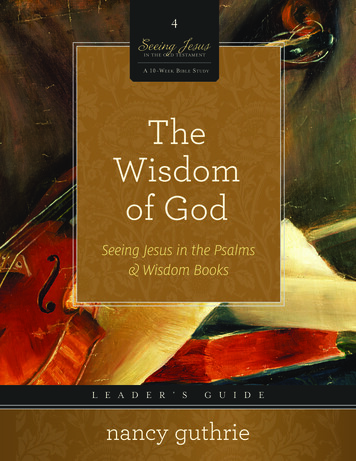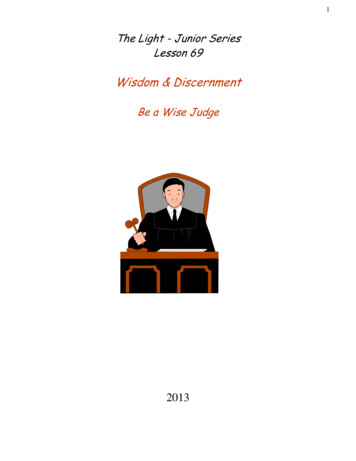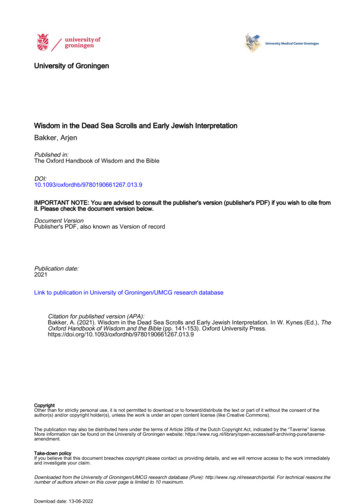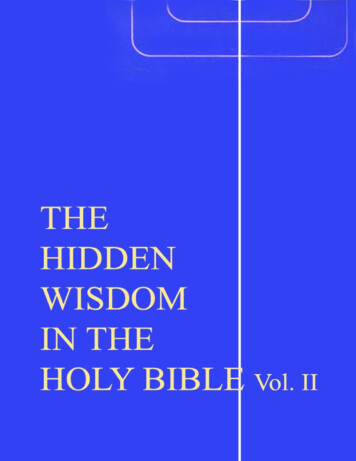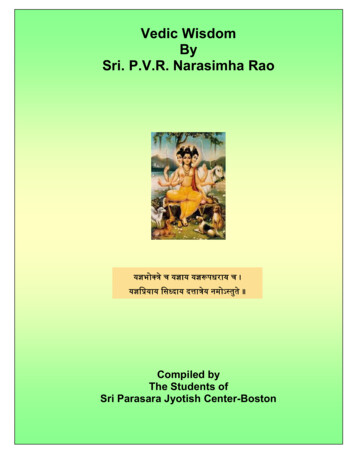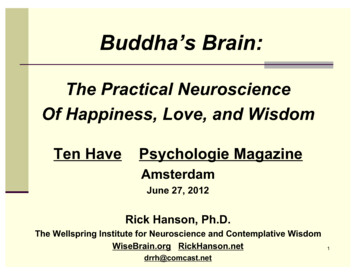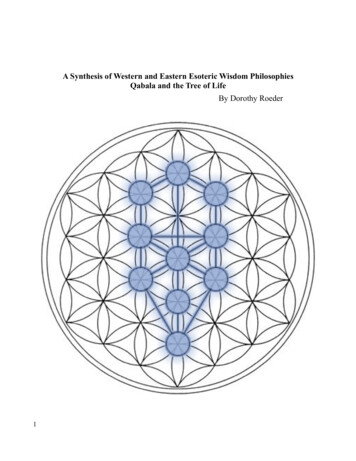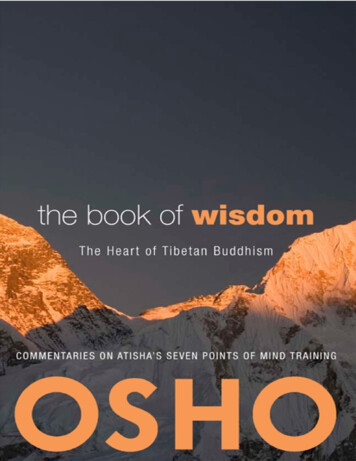
Transcription
The Book of WisdomDiscourses on Atisha's Seven Points of Mind TrainingTalks given from 11/02/79 am to 10/03/79 amEnglish Discourse series28 ChaptersYear published: 1993Previously published in two volumes.The Book of WisdomChapter #1
Chapter title: Atisha the Thrice Great11 February 1979 am in Buddha sVideo: NoLength:91minsFIRST, LEARN THE PRELIMINARIES.THINK THAT ALL PHENOMENA ARE LIKE DREAMS.EXAMINE THE NATURE OF UNBORN AWARENESS.LET EVEN THE REMEDY ITSELF GO FREE ON ITS OWN.SETTLE IN THE NATURE OF BASIC COGNITION, THE ESSENCE.BETWEEN SESSIONS, CONSIDER PHENOMENA AS PHANTOMS.TRAIN IN JOINING, SENDING AND TAKING TOGETHER.
DO THIS BY RIDING THE BREATH.THREE OBJECTS, THREE POISONS, THREE BASES OF VIRTUE.TRAIN WITH PHRASES IN EVERY MODE OF BEHAVIOR.Religion is not a science. Religion is not a science in the sense physics,mathematics and chemistry are sciences. But still it is a science because it is theultimate knowing: the word science means knowing. And if religion is not ascience, what else can be? It is the highest knowing, it is the purest knowing.Ordinary science is knowledge, not knowing: religion is knowing itself.Ordinary science is object-oriented -- it knows something, hence it is knowledge.Religion is not object-oriented; it has no object, it knows nothing. Knowingknows itself, as if the mirror is reflecting itself. It is utterly pure of all content.Hence religion is not knowledge but knowing.Science is a lower kind of knowing, religion is a higher kind. Religion isPHILOSOPHIA ULTIMA: the ultimate knowing. The difference between thetwo is not of the spirit -- the spirit is the same -- but the difference is certainly ofpurity.Science is mixed with much mud. Religion is pure essence, pure fragrance. Themud has disappeared, the lotus has appeared. And at the ultimate stage even thelotus has disappeared, only the fragrance abides. These are the three stages ofknowing: the mud, the lotus and the fragrance.Religion cannot be grasped, because there is no object in it. But still it can beunderstood.It cannot be explained, but it can be experienced. There is no way of informingyou about religion, because it cannot be reduced to information. But you can beshown the way, the path to it -- fingers pointing to the moon. The fingers are notthe moon, obviously, but the fingers can point to the moon.These "Seven Points of Mind Training" of the great master Atisha, are fingers,seven fingers pointing to the moon. Don't be caught by the fingers, don't becometoo much obsessed with the fingers. That is not the point, that will be missing thepoint. Use the fingers and forget them, and look where the fingers are pointing.And when you see the moon, who bothers about the fingers? Who remembers
them? They automatically become nonessential; they disappear.That's why for those who have experienced religion, all the scriptures becomeutterly useless, all methods become nonessential. When the goal is achieved, thepath is forgotten.Atisha is one of the rare masters, rare in the sense that he was taught by threeenlightened masters. It has never happened before, and never since. To be adisciple of three enlightened masters is simply unbelievable -- because oneenlightened master is enough.But this story, that he was taught by three enlightened masters, has ametaphorical significance also. And it is true, it is historical too.The three masters that Atisha remained with for many years were: first,Dharmakirti, a great Buddhist mystic. He taught him no-mind, he taught himemptiness, he taught him how to be thoughtless, he taught him how to drop allcontent from the mind and be contentless. The second master wasDharmarakshita, another Buddhist mystic. He taught him love, compassion. Andthe third master was Yogin Maitreya, another Buddhist mystic. He taught himthe art of taking the suffering of others and absorbing it into your own heart: lovein action.This could happen because all these three masters were great friends. They hadstarted their search together; while they were on the way they had remainedtogether, and when they attained they were still together.Atisha became a disciple of Dharmakirti. Dharmakirti said to him, "I will teachyou the first principle. And for the second you go to Dharmarakshita, and for thethird to Yogin Maitreya. This way you will know all the three faces of theultimate reality, the three faces of God -- the trinity, the TRIMURTI. And thisway you will learn each face from the person who is the most perfect in it."These are the three ways people reach to the ultimate. If you reach throughemptiness you attain the other two also, but your path remains basically that ofemptiness -- you know more about emptiness, so emptiness will be emphasizedin whatsoever you teach.That's what happened in Buddha's case. He had attained through emptiness,hence his whole teaching became emptiness-oriented. There is no God in
Buddha's teaching, because God is a thought, a content, an object -- God is theother, and Buddha had attained by dropping the other. Buddha had attained byemptying his mind totally, hence there is no place for God, no place for anythingat all. His path is the purest VIA NEGATIVA.That was also the case with Dharmakirti. He was the perfect master ofemptiness, a master par excellence of emptiness. And when Atisha had learnedhow to be empty, the master said, "It will be better for you to go toDharmarakshita for the next step, because he has attained from a totally differentpath. Just as you can reach Everest from different sides, he has reached from atotally different path, the path of compassion. I can also teach you the path ofcompassion, but my knowing about that path is only known from the top."I have reached through the path of emptiness. Once you reach the top, you canlook down at all the paths, they are all available to your vision. But to follow apath in its different dimensions, to follow a path in all its details, small details, isa totally different thing." And to look at it from a helicopter or from themountain-top is certainly a different vision; it is a bird's-eye view.And Dharmakirti said, "If there had been nobody available here, I would havetaught you the other too. But when a man like Dharmarakshita is just here, myneighbor, living in another cave just nearby, it is better you go to him."First one has to become empty, utterly empty. But you have not to cling toemptiness, otherwise your life will never know the positive expression ofreligion. Your life will miss the poetry, the joy of sharing; you will remainempty. You will have a kind of freedom, but your freedom will be only freedomfrom, it will not be freedom FOR. And unless a freedom is both -- freedom fromand freedom for -- something is missing, something is lacking; your freedomwill be poor. Just to be free from is a poor kind of freedom.The real freedom starts only when you are free for. You can sing a song and youcan dance a dance and you can celebrate and you can start overflowing. That'swhat compassion is.Man lives in passion. When the mind disappears, passion is transformed intocompassion.Passion means you are a beggar with a begging-bowl; you are asking and askingfor more and more from everybody; you are exploiting others. Your relationships
are nothing but exploitations -- cunning devices to possess the other, very cleverstrategies to dominate.When you are living in the mind, in passion, your whole life is power politics.Even your love, even your social service, even your humanitarian works, arenothing but power politics. Deep down, there is a desire to be powerful overothers.The same energy, when the mind is dropped, becomes compassion. And it takesa totally new turn. It is no longer begging; you become an emperor, you startgiving. Now you have something -- you had it always, but because of the mind,you were not aware of it.The mind was functioning like darkness around you, and you were unaware ofthe light within. The mind was creating an illusion of being a beggar, while allthe time you had been an emperor. The mind was creating a dream; in reality younever needed anything.All had already been given. All that you need, all that you can need, is alreadythe case.God is within you, but because of the mind -- mind means dreaming, desiring -you never look within, you go on rushing outwards. You keep yourself in thebackground, your eyes are turned towards the outside, they have become focusedthere. That's what the mind is all about: focusing the eyes on the outside.And one has to learn how to unfocus them from there -- how to make themloose, less rigid, more liquid, so that they can turn inwards. Once you have seenwho you are, the beggar disappears. In fact it had never existed; it was just adream, an idea.The mind is creating all your misery. With the mind gone, misery is gone, andsuddenly you are full of energy. And the energy needs expression, sharing; itwants to become a song, a dance, a celebration. That is compassion: you startsharing.Atisha learned compassion from Dharmarakshita. But compassion has two faces.One is inactive compassion: the meditator sits silently in his cave, showering hiscompassion over the whole existence. But it is a very inactive kind ofcompassion. You have to go to him to partake of it, he will not come to you. You
will have to go to the mountains to his cave to share his joy; he will not come toyou. He will not move in any way, he will not take any active step. He will notflow towards others, he will not seek and search for the people with whom hecan share his dance. He will wait.This is a feminine kind of compassion: just like a woman waits -- she nevertakes the initiative, she never goes to the man. She may love the man, but shewill never be the first to say "I love you." She will wait; she will hope that oneday or other, sooner or later, the man will propose. Woman is inactive love,passive love. Man is active love, man takes the initiative.And in the same way, compassion has two possibilities: the feminine and themasculine.From Dharmarakshita, Atisha learned the feminine art of being in love withexistence.One more step was needed: Dharmarakshita told him, "Go to Yogin Maitreya" -these three masters were all living together in the same vicinity -- "Go to YoginMaitreya and learn how to transform the baser energy into active energy, so lovebecomes active."And once love is active, compassion is active, you have passed through all thethree dimensions of truth -- you have known all. You have known utteremptiness, you have known compassion arising, you have known compassionshowering. Life is fulfilled only when all these three have happened.Because Atisha learned under three enlightened masters, he is called Atisha theThrice Great. Nothing more is known about his ordinary life, when and whereexactly he was born. He existed somewhere in the eleventh century. He was bornin India, but the moment his love became active he started moving towardsTibet, as if a great magnet were pulling him there. In the Himalayas he attained;then he never came back to India.He moved towards Tibet, his love showered on Tibet. He transformed the wholequality of Tibetan consciousness. He was a miracle-worker; whatsoever hetouched was transformed into gold. He was one of the greatest alchemists theworld has ever known.These "Seven Points of Mind Training" are the fundamental teaching that he
gave to Tibet -- a gift from India to Tibet. India has given great gifts to theworld. Atisha is one of those great gifts. Just as India gave Bodhidharma toChina, India gave Atisha to Tibet.Tibet is infinitely indebted to this man.These seven points, the smallest treatise you can find, are of immense value. Youwill have to meditate over each statement. They are the whole of religioncondensed: you will have to unfold each statement. They are like seeds, theycontain much. It may not be apparently so, but the moment you move into thestatements deeply, when you contemplate and meditate and start experimentingwith them, you will be surprised -- you will be going into the greatest adventureof your life.The first:FIRST, LEARN THE PRELIMINARIES.What are the preliminaries? These are the preliminaries. First: truth is. Truth isnot something to be created, truth is not something that is far away. Truth isherenow, truth surrounds you like the ocean surrounds the fish. The fish may notbe aware -- once the fish becomes aware of the ocean, the fish is enlightened.The fish is not aware, cannot be aware, because the fish is born in the ocean, hasalways lived in the ocean, is part of the ocean as any wave is part of the ocean.The fish is also a wave -- a little more solid, but born out of the ocean, lives inthe ocean and one day disappears in the ocean. The fish may never come toknow about the ocean. To know something, a little distance is needed.To know something, perspective is needed. And the ocean is so close, that's whythe fish may not be aware of it.And so is the case with truth, or if you like you can use the word god. So is thecase with god. It is not that he is far away, and that's why we don't know abouthim; it is because he is not far away but very close by. Even to say that it is closeby is not right, because you are it. He is within you and without: he is all and all.This is the first thing that has to be allowed to sink deep in your heart: truthalready is, we are in it. This is the most fundamental thing to begin with. You arenot to discover it; it is not covered. All that is needed is a new kind of awarenesswhich is missing in you. Truth is there, but you are not aware, you are not
mindful, you are not alert. You don't know how to watch, you don't know how toobserve, you don't know how to look and see. You have eyes but still you areblind, you have ears but you are deaf.The first preliminary is: truth is.The second preliminary is: mind is the barrier. Nothing else is hindering youfrom truth, just your own mind. Mind surrounds you like a film, like a moviethat goes on and on, and you remain engrossed in it, fascinated by it. It is afantasy that surrounds you, a continuous story that goes on and on. And becauseyou are so fascinated by it, you go on missing that which is. And mind is not; itis only a fantasy, it is only a faculty for dreaming.Mind is nothing but dreams and dreams -- dreams of the past, dreams of thefuture, dreams of how things should be, dreams of great ambitions,achievements. Dreams and desires, that is the stuff mind is made of. But itsurrounds you like a China Wall. And because of it the fish remains unaware ofthe ocean.So the second preliminary is: mind is the only barrier.And the third: no-mind is the door. Atisha calls no-mind BODHICHITTA: that ishis word for no-mind. It can be translated as buddha-mind, buddhaconsciousness, too. Or if you like you can call it christ-consciousness, krishnaconsciousness. It doesn't make any difference what name is used, but the basicquality of bodhichitta is that it is no-mind. It looks paradoxical: the mind in thestate of no-mind. But the meaning is very clear: mind without content, mindwithout thoughts, is what is meant, is what is indicated.Remember the word bodhichitta, because Atisha says the whole effort ofreligion, the whole science of religion, is nothing but an endeavor to createbodhichitta, buddha-consciousness: a mind which functions as a no-mind, amind which dreams no more, thinks no more, a mind which is just awareness,pure awareness.These are the preliminaries.The second sutra:THINK THAT ALL PHENOMENA ARE LIKE DREAMS.
Now the work starts. Atisha is very condensed, seedlike. That is the meaning ofa sutra: it is just a thread, just a hint, and then you have to decode it.THINK THAT ALL PHENOMENA ARE LIKE DREAMS."Phenomena" means all that you see, all that you experience. All that can ever beexperienced is all phenomena. Remember, not only are the objects of the worldphenomena and dreams, but also objects of consciousness. They may be objectsof the world, they may be just objects of the mind. They may be great spiritualexperiences.You may see kundalini rising in you: that too is a phenomenon -- a beautifuldream, a very sweet dream, but it is a dream all the same. You may see greatlight flooding your being, but that light is also a phenomenon. You may seelotuses blooming inside you and a great fragrance arising within your being:those too are phenomena, because you are always the seer and never the seen,always the experiencer and never the experienced, always the witness and neverthe witnessed.All that can be witnessed, seen, observed, is phenomena. Material phenomena,psychological phenomena, spiritual phenomena -- they are all the same. There isno need to make any distinction. The basic thing to remember is: that which canbe seen is a dream.THINK THAT ALL PHENOMENA ARE DREAMS.This is a tremendously powerful technique. Start contemplating in this way: ifyou are walking on the street, contemplate that people passing by are all dreams.The shops and the shopkeepers and the customers and the people coming andgoing, all are dreams. The houses, the buses, the train, the airplane, all aredreams.You will be immediately surprised by something of tremendous importhappening within you. The moment you think "All are dreams" suddenly, like aflash, one thing comes into your vision: "I am a dream too." Because if the seenis a dream, then who is this 'I'? If the object is a dream, then the subject is also adream. If the object is false, how can the subject be the truth? Impossible.If you watch everything as a dream, suddenly you will find something slippingout of your being: the idea of the ego. This is the only way to drop the ego, and
the simplest.Just try it -- meditate this way. Meditating this way again and again, one day themiracle happens: you look in, and the ego is not found there.The ego is a by-product, a by-product of the illusion that whatsoever you areseeing is true. If you think that objects are true, then the ego can exist; it is a byproduct. If you think that objects are dreams, the ego disappears. And if youthink continuously that all is a dream, then one day, in a dream in the night, youwill be surprised: suddenly in the dream you will remember that this is a dreamtoo! And immediately, as the remembrance happens, the dream will disappear.And for the first time you will experience yourself deep asleep, yet awake -- avery paradoxical experience, but of great benefit.Once you have seen your dream disappearing because you have become awareof the dream, your quality of consciousness will have a new flavor to it. The nextmorning you will wake up with a totally different quality you had never knownbefore. You will wake up for the first time. Now you will know that all thoseother mornings were false; you were not really awake. The dreams continued -the only difference was that in the night you were dreaming with eyes closed, inthe day you were dreaming with eyes open.But if the dream has disappeared because awareness happened, suddenly youbecame aware in the dream. And remember, awareness and dreaming cannotexist together.Here, awareness arises, and there, the dream disappears. When you becomeawake in your sleep, the next morning is going to be something so important thatit is incomparable. Nothing like it has ever happened. Your eyes will be so clear,so transparent, and everything will look so psychedelic, so colorful, so alive.Even rocks will be felt to be breathing, pulsating; even rocks will have aheartbeat. When you are awake, the whole existence changes its quality.We are living in a dream. We are asleep, even when we think we are awake.THINK THAT ALL PHENOMENA ARE LIKE DREAMS.First, objects will lose their objectivity. And second, the subject will lose itssubjectivity.
And that brings you to a transcendence. The object is no longer important, thesubject is no longer important, then what is left? A transcendental consciousness:bodhichitta -- just a witnessing, with no idea of 'I' and 'thou'; just a pure mirrorwhich reflects that which is.And God is nothing but that which is.The third sutra:EXAMINE THE NATURE OF UNBORN AWARENESS.Now you know what awareness is. You have known this transcendentalawareness where objects and subjects are no more existential. You have knownfor the first time this purity, this crystal-clear mirror. Now examine the nature ofthis awareness.Look into it, look deep into it. Shake yourself into as full alertness as possible.Wake up and see! And you will start laughing -- because now you will see therehas never been a birth, and there is never going to be a death.This is unborn and undying consciousness. It has always been here. It is eternal,it is timeless. And how afraid you were of death, and how afraid you were of oldage, and how afraid you were of a thousand and one things! And nothing hasever happened: all was a dream.Seeing this, one smiles, one laughs. Your whole life up to now has beenridiculous, absurd. You were unnecessarily afraid, unnecessarily greedy,unnecessarily suffering.You were living in a nightmare and it was your own creation.EXAMINE THE NATURE OF UNBORN AWARENESS.And you are freed from all misery, all suffering, all hell.LET EVEN THE REMEDY ITSELF GO FREE ON ITS OWN.And now don't start clinging to the remedy, to the method. That temptationarises. It is the last temptation, the very last effort of the mind to survive. Themind comes from a back door, it tries once more. Before it disappears forever, it
makes one more effort, and that effort is to cling to the method -- the method ofthinking that all phenomena are dreams.It has given you such joy, such a deep experience of reality, that naturally youwould like to cling to it. And once you cling you are back in the same old rutagain: the mind is back in disguise. Cling to anything and the mind is back,because clinging is mind. Hold on to anything, depend on anything, and themind is back, because the mind is dependence, slavery. Possess anything -- evena spiritual method, even a method of meditation -become a possessor, and you are possessed by it. Whether you possess money oryou possess a tremendously significant method of meditation, it doesn't matter.Whatsoever you possess, you will be possessed by it and you will be afraid tolose it.Once a Sufi mystic was brought to me. For thirty years continuously he had usedthe Sufi method ZIKR, and he had attained to great experiences. One could seeit; even ordinary people were aware that he was living in a totally differentworld. You could see it in his eyes, they were shining with joy. His very beinghad a vibe of the beyond.His disciples brought him to me, and they said, "Our master is a realized soul.What do you say about him?"I said, "Leave your master with me for three days, and then come back."The master stayed with me for three days. On the third day he was very angry,and he said, "You have destroyed my thirty years' work!" Because I told him asimple thing -just this sutra of Atisha: LET EVEN THE REMEDY ITSELF GO.I told him, "Now for thirty years you have been remembering one thing, that allis divine.The tree is God, the rock is God, the people are God, the dog is God, everythingis God -for thirty years you have been remembering it continuously." And he had reallymade a sincere effort.
He said, "Yes."I said, "Now stop remembering. How long are you going to remember? If it hashappened, then stop remembering and let us see what happens. If it has reallyhappened, then even after dropping remembering, it will remain."It was so logical that he agreed. He said, "It has happened."I said, "Then give it a try. For three days you forget remembering, stopremembering."He said, "I cannot stop, it has become automatic."I said, "You just wait and try."It took him at least two days, forty-eight hours, to stop. It was hard to stop, it hadbecome automatic. There was now no need to remember; for thirty years he hadbeen remembering, it was simply there like an undercurrent. But within fortyeight hours it stopped.And on the morning of the third day he was very angry. He said, "What have youdone?All that joy has disappeared. I am feeling very ordinary, I am feeling the same asI was before I started on the journey thirty years ago." He started crying out ofanger and out of sadness; tears started coming to his eyes. He said, "Give meback my method -- please don't take it!"I said, "Just look! If this is so dependent on the method, then nothing hashappened. It is just an illusion that you are creating by continuous remembering.This is nothing but autohypnosis."All the great masters say this, that one day you have to drop the method. And thesooner you drop it, the better. The moment you attain, the moment awareness isreleased in you, immediately drop the method.Just look: this is only the fourth sutra. In the third sutra Atisha says: EXAMINETHE NATURE OF UNBORN AWARENESS.And in the fourth, immediately:
LET EVEN THE REMEDY ITSELF GO.Now no more examination, no more mindfulness, no more remembering that allis a dream. Once the first taste of awareness has happened on your tongue, bequick! Because the mind is very cunning -- the mind can start telling you, "Look,you are no longer ordinary, you are extraordinary. Look, you have attained.Look, you have become a buddha, you are enlightened. Look, this is the goal ofall human beings, and very rarely, one in a million attains. You are that one in amillion."The mind will say all these beautiful sweet nothings, and of course the ego cancome back. You can start feeling very good, holier than thou. You can startfeeling special, spiritual, saintly. And all is lost. Through the remedy, the diseaseis back. Cling to the remedy, and the disease is back.One has to be very alert about dropping the method. Once you attain something,immediately drop the method, otherwise your mind will start clinging to themethod. It will talk very logically to you, saying, "It is the method that isimportant."Buddha used to tell a story again and again. Five idiots passed through a village.Seeing them, people were surprised, because they were carrying a boat on theirheads. The boat was really big; it was almost crushing those five idiots, theywere almost dying under the weight of it. And people asked, "What are youdoing?"They said, "We cannot leave this boat. This is the boat that helped us to comefrom the other shore to this shore. How can we leave it? It is because of it thatwe have been able to come here. Without it we would have died on the othershore. The night was coming close, and there were wild animals on the othershore. It was as sure as anything that by the morning we would have been dead.We will never leave this boat, we are indebted forever. We will carry it on ourheads in sheer gratitude."This can happen, because all minds are idiots. Mind as such is idiotic.The origin of the word idiot is beautiful to remember. Idiocy means somethingprivate, something special, something that is your own, something eccentric.That is the basic meaning of idiocy -- to function in an eccentric way.
The mind always functions in an eccentric way, the mind is always an idiot. Thereally intelligent person has no mind. Intelligence arises out of no-mind, idiocyout of the mind.Mind is idiotic, no-mind is wise. No-mind is wisdom, intelligence.Mind depends on knowledge, on methods, on money, on experience, on this andthat.Mind always needs props, it needs supports, it cannot exist on its own. On itsown, it flops.So the ultimate effort of the mind to come back will be when you attain to someawareness. It will say, "Look, so we have arrived." The moment somethinginside you says, "We have arrived," beware! Be very very cautious now, eachstep has to be of great caution.LET EVEN THE REMEDY ITSELF GO FREE ON ITS OWN.Now please don't cling to the remedy, to the method. This is the emphasis of J.Krishnamurti -- but this is his first sutra. It should be the fourth. That's where heis wrong; it cannot be the first sutra. How can you drop a method that you havenever used?You can only drop a method that you have used.Atisha is far more logical, far more scientific, than J. Krishnamurti. But I canunderstand why he emphasizes it, because he is afraid that if you go into the firstthree sutras the fourth may never arrive, you may be lost in the first three. Manyare lost in the preliminaries, many are lost in the methods. So he has become toocautious, extremely cautious.Those five idiots were carrying the boat, and J. Krishnamurti is on the othershore teaching people: "Don't enter the boat" -- too cautious! -- "because if youenter the boat, who knows, you may start carrying the boat on your head. Soplease don't enter it."And there are many who have become afraid of entering the boat. But to beafraid of entering the boat is the same idiocy; there is no difference. One who is
afraid of entering the boat is the same person who will carry the boat; otherwisewhy should you be afraid?There are old friends of mine who have followed J. Krishnamurti for their wholelife.They come to me and say, "We would like to come here, but we are afraid of allthe methods that you teach. Methods are dangerous," they say.Methods are dangerous only if you are unaware; otherwise they can be usedbeautifully.Do you think a boat is dangerous? It is dangerous if you are thinking to carry iton your head for your whole life out of sheer gratitude; otherwise it is just a raftto be used and discarded. All methods are rafts to be used and discarded, usedand abandoned, used and never looked back at again -- there is no need, nopoint!These are two extremes. At one extreme are those five idiots, and at the otherextreme are the followers of J. Krishnamurti. There is no need to be either. Myapproach is: Use the boat, use beautiful boats, use as many boats as possible;with this awareness, when the shore is reac
The three masters that Atisha remained with for many years were: first, Dharmakirti, a great Buddhist mystic. He taught him no-mind, he taught him emptiness, he taught him how to be thoughtless, he taught him how to drop all content from the mind and be contentless. The second master was


